In today’s fast-paced world, the concept of self-care has become increasingly vital for our well-being. It’s not just about indulging in spa treatments and leisurely baths, though those can certainly be part of it. Self-care encompasses a diverse range of practices that contribute to your physical, emotional, social, spiritual, personal, and financial health. It’s the act of nurturing your own well-being and ensuring that your “cup” stays full so you can also better care for those around you.
In this comprehensive guide, we’ll delve into these different dimensions of self-care, offering insights and practical tips to help you prioritize your own well-being and find a balance that suits your unique needs and circumstances.
Table of Contents
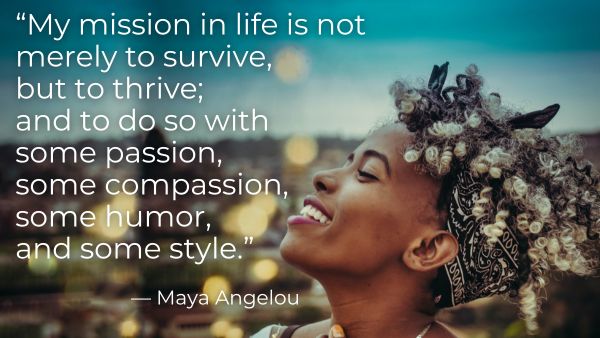
Why Self-Care Is Important
Self-care is the foundation of your overall health, both physical and mental. Taking care of your body, mind, and spirit will allow you to thrive, even when you are dealing with difficult circumstances.
Self-care fills your metaphorical “cup,” which will also give you the emotional and physical energy you need to take care of others. As the saying goes, you have to put on your own oxygen mask before you can help others with theirs.
Types of Self-Care
Self-care comes in many different flavors. Many people think of bath bombs and facials when they think of self-care, and while these can potentially be a fun and effective self-care strategy, there are actually many other important ways to practice taking care of yourself. Below we will take a look at each type and some examples of each.
Physical Self-Care
Physical self-care involves taking care of your body. Aspects of physical self-care include sleep, nutrition, hydration and movement (stretching, walking, yoga, etc.).
In addition to the more obvious forms of physical self-care, other examples include receiving regular and/or necessary medical care, oral hygiene (regular brushing, flossing, dental visits, etc.), taking necessary medication(s), and reducing or eliminating alcohol, smoking, or other substances, if necessary.
Another potential way to take care of your body physically is to practice relaxation strategies such as deep breathing or body scans or to receive a massage (either professional or from a loved one).
Emotional Self-Care
Emotional self-care is all about taking care of your emotional health. Examples include developing a toolkit of healthy coping skills, practicing self-compassion, and finding ways to manage your stress (either by eliminating unnecessary stressors or by being intentional about making time to de-stress/unwind).
Other effective emotional self-care strategies include allowing and acknowledging your emotions, practicing gratitude, regularly unplugging from tech/social media, taking time for humor and/or laughter, and therapy.
Social Self-Care
Social self-care involves fostering healthy connections in your life. This includes friendship, family (genetic or chosen), and your overall support system. One crucial aspect of social self-care is being able to set healthy boundaries, including communicating your needs, asking for help when you need it, and being able to say “no”.
Another example of social self-care would be curating your social media so that you only follow those who inspire you or bring you joy, rather than draining you or bringing you down. Volunteering or taking time to do something nice for others (even something as small as giving a compliment or holding the door for someone) can also be beneficial.
Finally, a crucial aspect of social self-care is making sure to take time to yourself. This can be especially true if you are introverted, have a low social battery, or are dealing with any sort of condition that drains your energy.
Spiritual Self-Care
Spiritual self-care involves fostering your spiritual health. While this would typically be tied to your religion, even those who are not religious can still benefit from certain spiritual practices.
If you are religious, examples of spiritual self-care include reading spiritual texts, attending spiritual services, or prayer to a higher power.
If you are not religious, examples of spiritual self-care might include practicing mindfulness, meditation, spending time in nature, or self-reflection (without judgement!).
Personal Self-Care
Personal self-care involves fostering your own personal development. This includes setting goals for yourself, discovering your own identity (values, traits, likes/dislikes, etc.), and practicing authenticity.
Other examples of personal self-care include engaging in your hobbies (outlets for self-expression, creativity, joy, etc.), journaling, accomplishing necessary tasks (applying for school, booking appointments, etc.), or letting go of unnecessary tasks.
Doing things that bring your appearance more in line with your authentic self (getting your hair cut, wearing clothes that feel good, etc.) or purely for the sake of fun would also fall under personal self-care.
Spatial Self-Care
Self-care related to your space starts with living and working in environments where you feel safe, both physically and emotionally. This may be easier for some than for others to accomplish.
For instance, if you are under 18 and don’t feel safe at home or if you don’t have the financial means to leave your current situation, then you may not have as many options. In these situations, start with spending as much time in safe spaces as possible (at a friend’s house, with relatives, etc.). Also, know that there are resources that may be able to help you (for example, the National Domestic Violence Hotline or the National Child Abuse Hotline.
If your work environment is not physically safe and your management is not concerned with making it so, you can file an anonymous complaint with OSHA. If your living or work environment is promoting toxic interactions (whether it be through unhealthy coping mechanisms or just plain bad culture), it may be healthy to consider moving on if possible.
Once you are in a safe space, spatial self-care looks like organizing your space in a way that works for you, keeping your space relatively clean, and decorating in a way that feels soothing or fun and authentic to you. Decluttering your space can help you to feel overall less stressed and be more productive.
Financial Self-Care
Financial self-care involves taking care of your money. Examples of financial self-care include paying necessary bills (gotta keep that power on!), creating a budget for yourself, and engaging in sustainable spending. When possible, saving for both emergencies and major life goals (such as buying a car or traveling) are also part of financial self-care.
Financial self-care can also look like splurging when it is financially feasible as well as setting boundaries, both with yourself and with others (i.e., not letting others take advantage of you financially).
Work Self-Care
Having good self-care at work can be especially challenging, as many companies do not support good self-care habits and you may not have as much say as you do in the rest of your life.
Some examples of work self-care include having healthy boundaries with management (i.e., not responding to emails/texts or doing work tasks after hours), taking your scheduled breaks and lunches, and practicing good time management with your work responsibilities so that you don’t feel overwhelmed.
If your job is being a full-time parent, setting aside time to be with other adults or taking time for yourself can be both especially challenging and especially important for self-care.
Other important aspects of work self-care include being in a healthy work environment (as mentioned before), negotiating for your needs (benefits, pay raise, time off, etc.), and taking time off when able. Finally, recognizing burnout can be an important aspect of work self-care, especially if you work in a high-stress field.
Finding Balance in Self-Care
Self-care may look very different depending on the person or even the day. You may want to lean into physical activity and spending time outside, while someone else may find that attending spiritual services and painting may be more their jam. Some days you might need to veg out on the couch and other days you may need to clean the whole house.
Variety and variability can be strengths when it comes to self-care. Try not to “put all your eggs in one basket.” Reliance on one strategy can be problematic when things may change over time.
For example, if running is your one method of self-care and then you sprain your ankle and can’t run for a month, then you may find yourself significantly more affected than if you had a wider variety of self-care activities to choose from.
Click below for a printable handout summarizing the 8 types of self-care with examples for each.
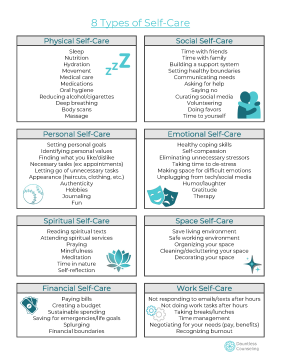
Where to Start – Hierarchy of Needs
Maslow’s Hierarchy of Needs can be a helpful framework when you’re not sure where to start with your self-care. When you can, start at the bottom of the pyramid and work your way up.
For instance, make sure you’ve had sufficient food, water, and rest (biological needs) before spending a significant amount of energy on a work project (esteem needs).
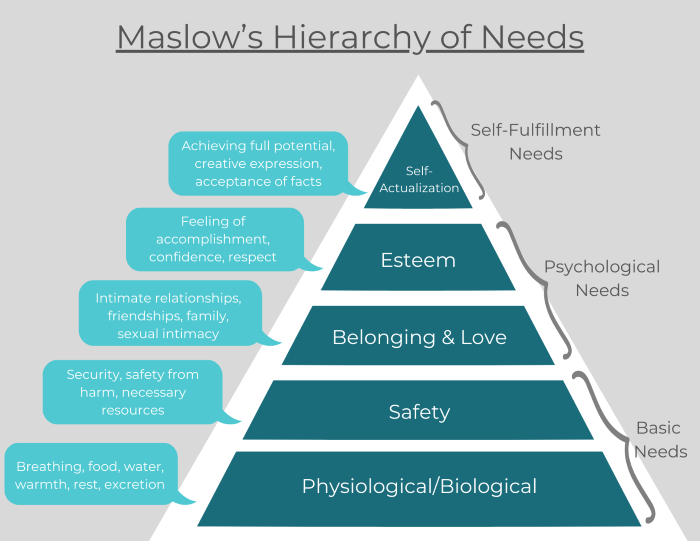
Spoon Theory
If you have a chronic health condition, you may not have as much energy for self-care (or anything else) as others do. One analogy for this that my clients have appreciated is called Spoon Theory.
Spoon Theory refers to the idea that we all wake up at the start of our day with a certain number of spoons (i.e. energy) that we get to “spend.” You may wake up with 10 spoons on some days and only 5 spoons on others. Getting up, showered, and dressed may take 1 spoon for one person and 3 spoons for someone else (especially someone dealing with a chronic condition).
If you woke up with 5 spoons and 3 of them are now gone by the time you’re dressed, you can see how you might have to be much more selective in how you “spend” your spoons.
Fork Theory
Fork Theory is the compliment to Spoon Theory. Fork Theory says that everybody is dealing with different forks “stuck” in them. Forks can be minor annoyances or major stressors and different stressors may be a different size fork for different people.
For example, having cancer would be a giant freaking fork. Having to pee might be a fairly small fork but get bigger the longer you can’t get to the bathroom.
In regards to self-care, it can be helpful to focus on pulling out the easy forks first (for example, going to the bathroom). This can make it somewhat easier to tolerate the larger forks that you may or may not be able to do anything about at the moment.
Generally speaking, self-care can also give you more energy to tolerate the forks that you can’t immediately remove.
Swiss Cheese Model
The Swiss Cheese Model of self-care refers to how there are “holes” in every method of self-care (just like a piece of Swiss cheese). One method is never going to meet all of your needs or take care of all of your stress, but if you layer enough kinds of self-care, eventually, you’ll be fully covered.
Check out this great graphic by Dr. Miranda for a visual representation.

Creating a Self-Care System
When working on putting together your own self-care system, find what works best for YOU.
When you first start trying to work on improving your self-care, try to focus on only one or two changes at a time. Practice these until they become relatively automatic.
After you’ve picked what you’d like to practice, then decide on a strategy to help you remember to work on these. Try your strategy for a week or so before re-evaluating to decide if it’s working for you or not.
Some options for self-care reminders might include:
- Putting alarms in your phone
- Using a planner to write out your self-care goals/plan
- Deciding on a regular schedule that you can easily remember
- For example, “I’m going to take 15 minutes each evening before bed to drink my favorite herbal tea.”
- Hanging sticky notes/posters where you will see them
- Self-Love Rainbow has numerous adorable resources for this and other self-care tools
Self-care apps can be another useful tool. Two good examples are Daylio and Finch.
- Daylio is a “Self-Care Bullet Journal with Goals Mood Diary & Happiness Tracker.”

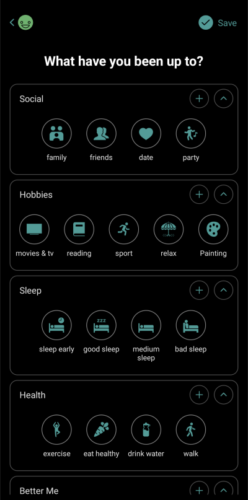
- Finch: Self-Care Pet is an adorable self-care app where you “take care of your pet by taking care of yourself.”

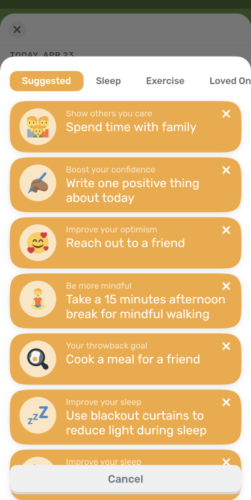
Once you feel confident in these habits, then you can decide what else you might want to work on using the tools that work best for you.
Challenges of Self-Care
Self-care can be challenging. Here are some common concerns.
Not Enough Time
Often the clients that I work with report that they don’t have the time for self-care. The problem with this mentality is that if you don’t take time for your wellness, then eventually you will be forced to take time for your illness. If you don’t have a lot of time, try to prioritize small changes, as these can often make a big difference in the long-run.
Not Deserving
Another common concern is that you may feel like you don’t “deserve” to take care of yourself. The thing is, if you are human, then you deserve self-care. Often the feeling follows the action, rather than the other way around.
If it’s helpful, remember that taking care of yourself is the opposite of selfish, as in the long run this will help you to take better care of others as well.
Long-Term Mindset
Another important point to keep in mind is that self-care may or may not feel good in the moment. Not all self-care looks like a spa day! When considering what self-care habits may be important for you, think about what long-term benefits you will get out of each action.
For example, brushing your teeth may not be fun, but it will help you avoid costly and painful dental work down the line. Or sitting still to have your hair or nails done may feel like torture, but it may help you to feel more authentic to how you would like to look and feel.
Closing Thoughts
In the rush of our daily lives, it’s all too easy to overlook the importance of self-care. Yet, as we’ve explored the various dimensions of self-care – from physical and emotional well-being to nurturing our social connections and creating a harmonious environment – it becomes clear that self-care isn’t a luxury; it’s a necessity. Self-care is the foundation upon which we build our health, happiness, and resilience.
Prioritize yourself, because you deserve it, and the world will be a better place for it.
As a reminder, this blog post is not intended as professional counseling or clinical advice. This article is meant to provide you with some helpful information about using self-care to improve your mental health. If you are struggling with your mental health, I encourage you to consider reaching out for additional support, professional or otherwise.

-Kristel Roper, LMFT, LPCC
Kristel Roper is a licensed psychotherapist offering therapy services to individuals in the Sacramento area. She specializes in therapy for anxiety and OCD and especially enjoys working with young women as they navigate the challenges of relationships, college, career, and beyond. If you have a question for Kristel or are interested in therapy for yourself or your loved one, feel free to reach out.
Photo by Nick Owuor (astro.nic.visuals) on Unsplash
